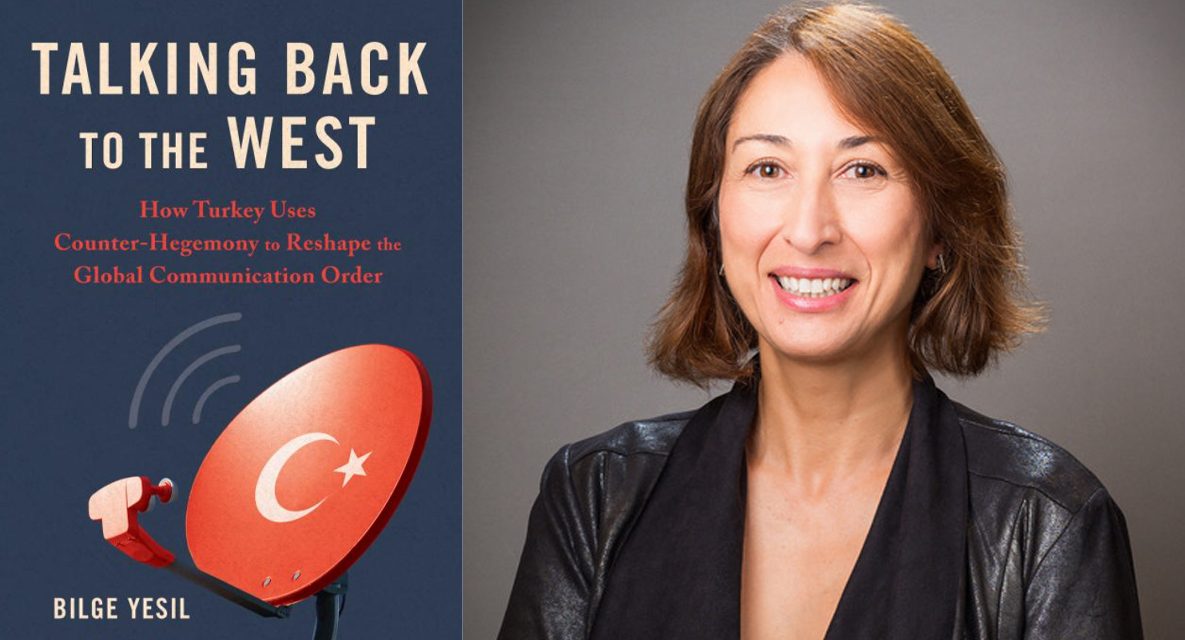College of Staten Island Professor of Media Culture Bilge Yesil has been awarded the Distinguished Scholarship Award – Best Book of 2025 from the National Communication Association’s International and Intercultural Communication Division. The award recognizes Yesil’s latest book, Talking Back to the West: How Turkey Uses Counter-Hegemony to Reshape the Global Communication Order, for its outstanding contribution to the study of international communication.
Published in 2024, Talking Back to the West offers a critical examination of how Turkey’s ruling Justice and Development Party (AKP) has sought to reposition the country on the world stage. In the 2010s, the AKP launched an English-language media system to elevate Turkey’s image, counter Western criticism of its increasingly authoritarian practices, and promote its own geopolitical and economic interests.
Yesil’s analysis traces how AKP-backed outlets frame Turkey as a champion of the oppressed and a counterweight to Western powers. At the same time, she reveals how these media and communication initiatives often obscure facts, rely on identity politics, and weaponize anti-Western rhetoric to consolidate domestic power and bolster Turkey’s regional ambitions. The book has received terrific reception, and she is thankful for the honor received from the NCA.
“It really feels wonderful to receive this recognition from my peers,” said Yesil. “As academics, we invest a great deal of time and energy in our work—often over many years—so it is deeply rewarding to see it recognized and appreciated by readers. It’s also a reminder that all those long days (and nights) of research and writing were worthwhile, and that the ideas I hoped would spark conversation are finding an audience.”
Yesil was prompted to research and publish Talking Back to the West nearly a decade ago when completing her previous book, Media in New Turkey. “I began to notice a significant uptick in the Turkish government’s English-language communication efforts. This prompted me to analyze the activities of various state-run news channels, public relations and public diplomacy institutions,” she explained. “Around the same time, Turkey was expanding its journalism training programs for media professionals from the Global South, and its historical TV dramas were gaining increasing popularity worldwide, especially among Muslim audiences. As I analyzed these state-run activities, I identified several key narratives promoted by the government: Turkey as a benevolent power reshaping the global order, the West as morally bankrupt, Muslims as victims of Western hegemony, and Turkish Muslim civilization as superior to Western civilization. I wanted to further explore the origins, evolution, and implications of these narratives, and that ultimately inspired me to write this book.”
In recognizing Yesil’s work, the International and Intercultural Communication Division of the National Communication Association highlighted the book’s innovative approach to understanding how communication strategies intersect with authoritarianism, religion, and identity politics. The Division is one of NCA’s most active scholarly communities, dedicated to advancing research and teaching that explore communication across cultural and national boundaries.
Yesil hopes that her book will inspire more conversations and scholastic research on communication strategies countries are utilizing across the world through lenses outside of traditional methods.
“Much of the existing scholarship in state-sponsored political communication approaches these practices through the lenses of international relations, foreign policy, or conflict, often framing them as forms of propaganda, public diplomacy, or soft power. In my book, I take a different approach by adopting a cultural framework,” she explained. “I wanted to look closely at the ideologies, symbols, and narratives that organize the Turkish government’s global messaging—how references to Western imperialism, Muslim identity politics, and nationalist-Islamist ideology shape how Turkey presents itself to the world. By exploring the role of religion, history, culture, and identity in this process, I aimed to broaden our understanding of state-run political communication—not just as diplomacy or propaganda, but as a deeply cultural and ideological practice. Ultimately, I hope the book encourages other scholars to apply similar approaches when examining the communication strategies of countries like China, Russia, the United States, or others around the globe.”
With Talking Back to the West, Yesil adds to her distinguished record of scholarship on media, politics, and international communication. The award underscores both her global impact as a researcher and the College of Staten Island’s role as home to faculty producing internationally recognized work.

















